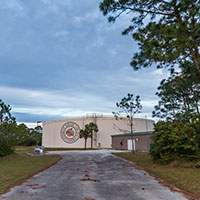 John’s Island seeks to build a pipeline under the lagoon
John’s Island seeks to build a pipeline under the lagoon
STORY
John’s Island wants to build a $6 million, 5-mile-long pipeline, about a mile of it under the Indian River Lagoon, to meet long-term irrigation-water needs. The pipe will carry “reclaimed” water from Indian River County’s wastewater plants that has been treated to a high level of purity, just shy of drinking water.
The 1,650-acre barrier island gated community – which until now has been getting most of its irrigation water from the City of Vero Beach – needs more reclaimed water for its two island golf courses, and for its 1,382 residents, who live in large single-family homes with big lawns and in condominiums with acres of lushly planted communal land.
Vero Beach is unable to fully meet John’s Island’s reuse water needs.
The John’s Island Property Owners Association, formed in 1969, created John’s Island Water Management, Inc. around 1990 to handle irrigation water, said Jim Moller, whose duties as general manager include overseeing both, which he has done for 25 years.
The original irrigation infrastructure in the club cost about $3 million, Moller said, including pipes, three pumping stations, a retention pond and lake. The water management company is nonprofit. It sells irrigation water only, not potable water, at a price that covers its operations and maintenance. The current rate is $2.26 per 1,000 gallons, and there are no plans to raise the rate to pay for the new infrastructure.
The Indian River County Commission approved selling 1 million gallons a day of reclaimed water to John’s Island for 25 years at half the going rate at a recent meeting. The current rate is .67 cents per 1,000 gallons. In exchange, John’s Island will build the 16-inch piping system and then turn it over to the county, recouping the cost over the 25-year period via the differential between what it pays and what it charges for the water.
Deeding the pipeline to the county simplifies the permitting process because the county owns the needed right of way where a bridge, no longer in existence, crossed the lagoon. Moller said the U. S. Army Corps of Engineers has already granted a permit for the project and the Florida Department of Environmental Protection permit “is pretty close.”
The pipe will start at the county’s 3-million-gallon effluent tank at 77th Street, near Old Dixie Highway, where there is a pumping station. The pipe will then run down Old Dixie Highway to 71st Street, than take a jog east to U.S. 1, running south three blocks to 69th Street.
It will connect to Old Quay Bridge Road, about half a mile in from the river. The pipe then runs at a north-east angle 80 feet under the lagoon. On the island, the pipe follows Shores Drive and Sea Oak Drive and then runs south to its final destination, Lake Rheams, which also has a pumping station owned by John’s Island.
The county will benefit by gaining infrastructure reaching reclaimed-water customers on the island. John’s Island will get 20 percent of the revenue from these new customers for 25 years. John’s Island will pay the going rate, not the discounted price, for water exceeding 1 million gallons a day.
The county will also benefit by diversifying how it disperses 4.8 million gallons of daily effluent from its wastewater treatment plants.
Director of Utilities Vincent Burke told county commissioners effluent is increasing with the push to convert residences from septic to county sewer.
John’s Island will benefit by diversifying where it gets irrigation water. For nearly 30 years the community has gotten most of its reclaimed water from the City of Vero Beach, which produces 3.2 million gallons a day for irrigation, but the city doesn’t have any more to spare for John’s Island’s increased needs.
John’s Island has an agreement with the city to purchase 1 million gallons of reclaimed water a day, said Moller. “But in the middle of summer, we only get about three-fourths of that and we have to make up the difference with well water.”
“We want to get off well water and keep it as a backup,” Moller said.
John’s Island’s wells tap into the Upper Floridan Aquifer, which is increasingly contaminated with salt due to rising seas, and salt-laden water can be harmful to plants. In addition, use of water from the aquifer for irrigation is restricted by the Florida Department of Environmental Protection and St. John’s Water Management District.
Those agencies say the Upper Floridan must be conserved primarily for current and future drinking-water needs. “Every time we renew our Consumptive Use Permit we spend about $60,000 in engineering fees and they restrict our use more,” Moller said.
The pipeline deal still needs the blessing of Indian River Shores Town Council. John’s Island is within the town limits and must be granted a franchise agreement allowing it to sell county reclaimed water within its borders.
“The Town is in the process of reviewing existing contracts with the City of Vero Beach and seeking to understand how the water is to be distributed and sold, particularly outside the John’s Island area,” Town Manager Robbie Stabe said.
Indian River Shores has an exclusive contract with Vero Beach for drinking water and sewer service but a non-exclusive agreement with the city for reclaimed water, according to Moller, Burke and Vero Beach Water and Sewer chief Rob Bolton.
“We are moving forward with our review,” Stabe said, “and hope to have it addressed by council in the February time frame.”








